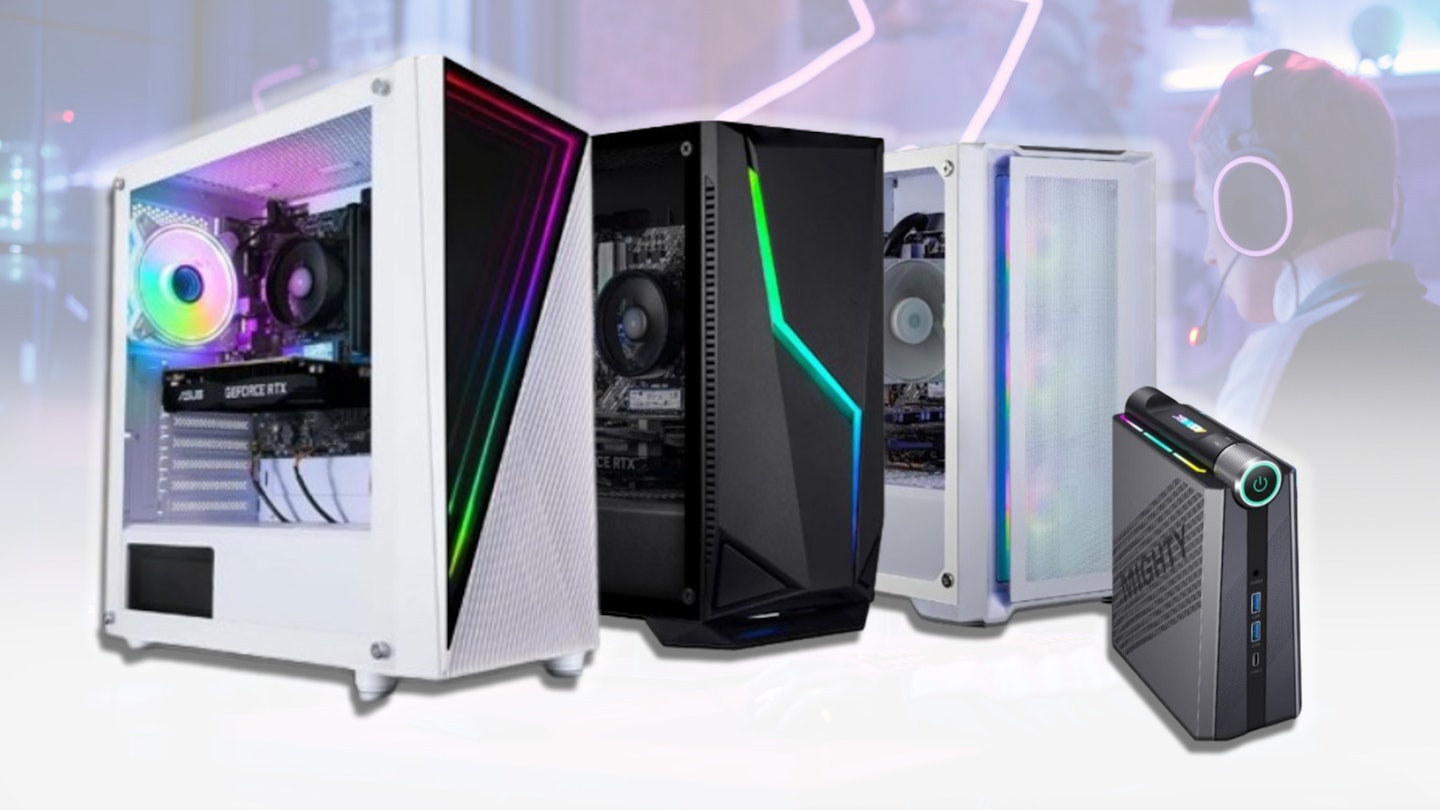Every serious gamer wants to score one of the best PCs of the year, but what if you could achieve those big wins on one of the best gaming PCs under £1,000? Even with next-gen consoles providing ever-better 4K gaming on a budget, the popularity of PC gaming is still on the rise. And that's partly thanks to the sheer performance on offer – with super-high frame rates and advanced graphics that leave consoles in the dust.
While consoles are fantastic ways to experience gaming – you'll find that they don't have the freedom, open customisation and the sheer library of games available to PC gamers. So, with an audience of approximately 1.8 billion players (and rising), it's safe to say that the best gaming PCs offer a huge platform that's here to stay. But how do you go about choosing the right machine for you?
To help you easily uncover some excellent gaming experiences, we've rounded up the best gaming PCs under £1,000. These are a little more expensive than your standard budget gaming PC, but they're all ready to go right out of the box.
These powerful PCs will be ideal for accessing smooth and immersive gaming experiences. With hugely respectable CPUs, GPUs and RAM, our selected options are perfect for gamers, content creators and budding streamers. If you're stuck on all the jargon we've included a buyer's guide and some games' system specifications, including Fortnite and Call Of Duty. So, let's gear up and find the perfect PC gaming rig for you.
Best gaming PCs under £1,000 in 2025 at a glance:
• Best overall: PCSPECIALIST Icon 240 – View on Currys
• Best budget: CYBERPOWERPC Wyvern Gaming PC – View on Amazon
• Best for graphics: AlphaSync Gaming PC, AMD Ryzen 5, RTX 4060Ti – View on Ebuyer
• Best bundle: Vibox IV-8 Gaming PC – View on Amazon
Best gaming PCs under £1,000 in 2025:
Please note: All prices are correct at the time of writing. Prices, stock and deals are subject to change without notice.
Best overall
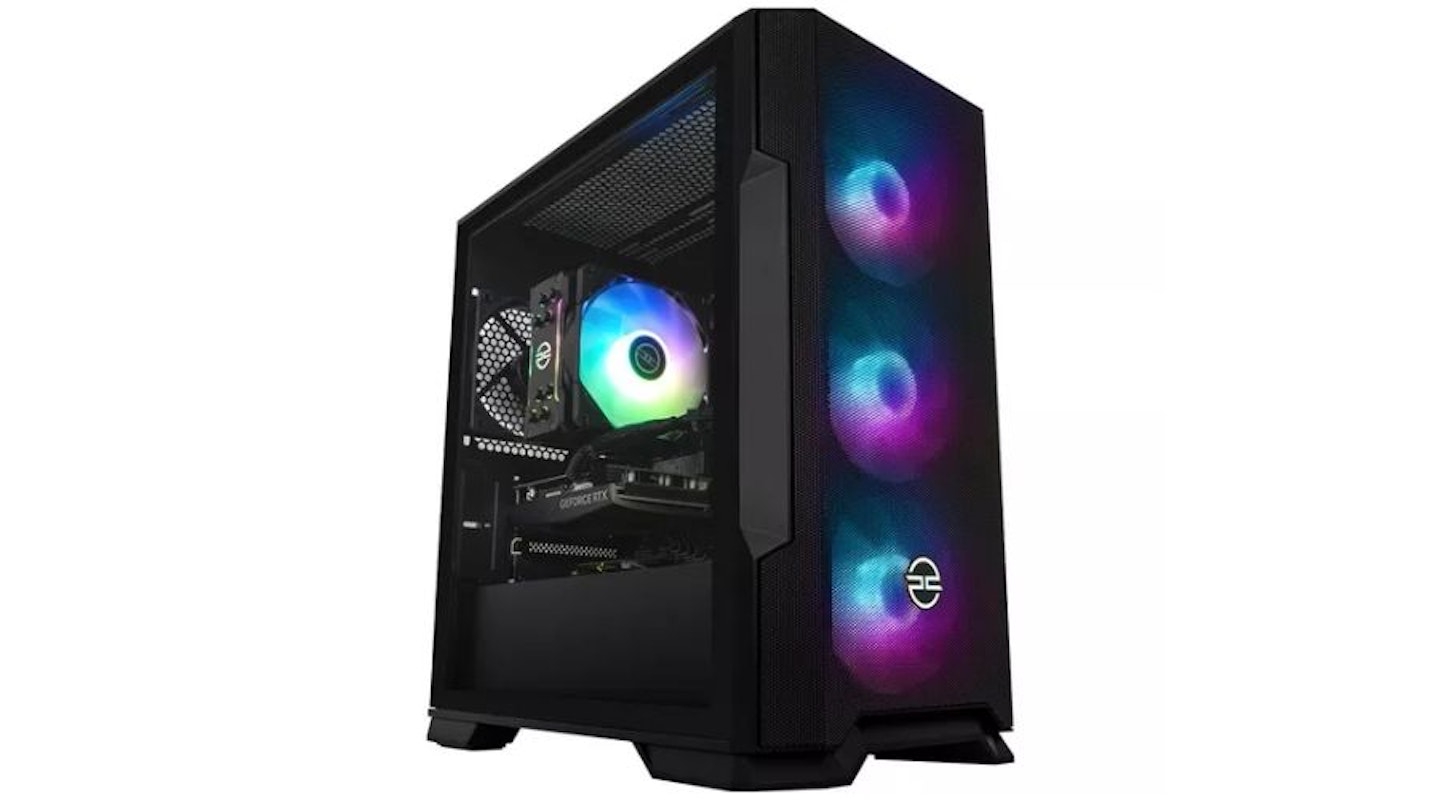 PCSPECIALIST
PCSPECIALISTOur top pick for the best gaming PC under £1000 is this highly capable machine from PCSPECIALIST. In addition to the brilliant Nvidia RTX 4060 graphics card, it has 16GB of RAM. Together, that makes for both high-speed and cutting-edge graphics. It also has a very respectable 1 TB SSD storage.
Alongside a very solid AMD Ryzen 5 CPU, there's a large, well-designed case for plenty of airflow. Plus, if you're itching for some RGB lighting, this has you covered.
Despite not having 32GB RAM, the excellent CPU and RTX 4060 GPU ensure that there's no doubt that the rig can perform brilliantly with any of the latest games. We think it's a bit of a steal at well under the £1000 mark.
Pros
- The fantastic RTX 4060 GPU from Nvidia is right up there with the best gaming PCs
- Generous 1TB SSD for fast boot and load times
- The case has good airflow and looks modern
Cons
- 16GB is solid, but you may wish it had 32GB for the best load times
| CPU | AMD Ryzen 5 |
| GPU | RTX 4060 |
| RAM | 16GB |
| Storage | 1TB SSD |
| Dimensions | 415 x 210 x 400 mm (H x W x D) |
| Weight | 8.51 kg |
Best budget
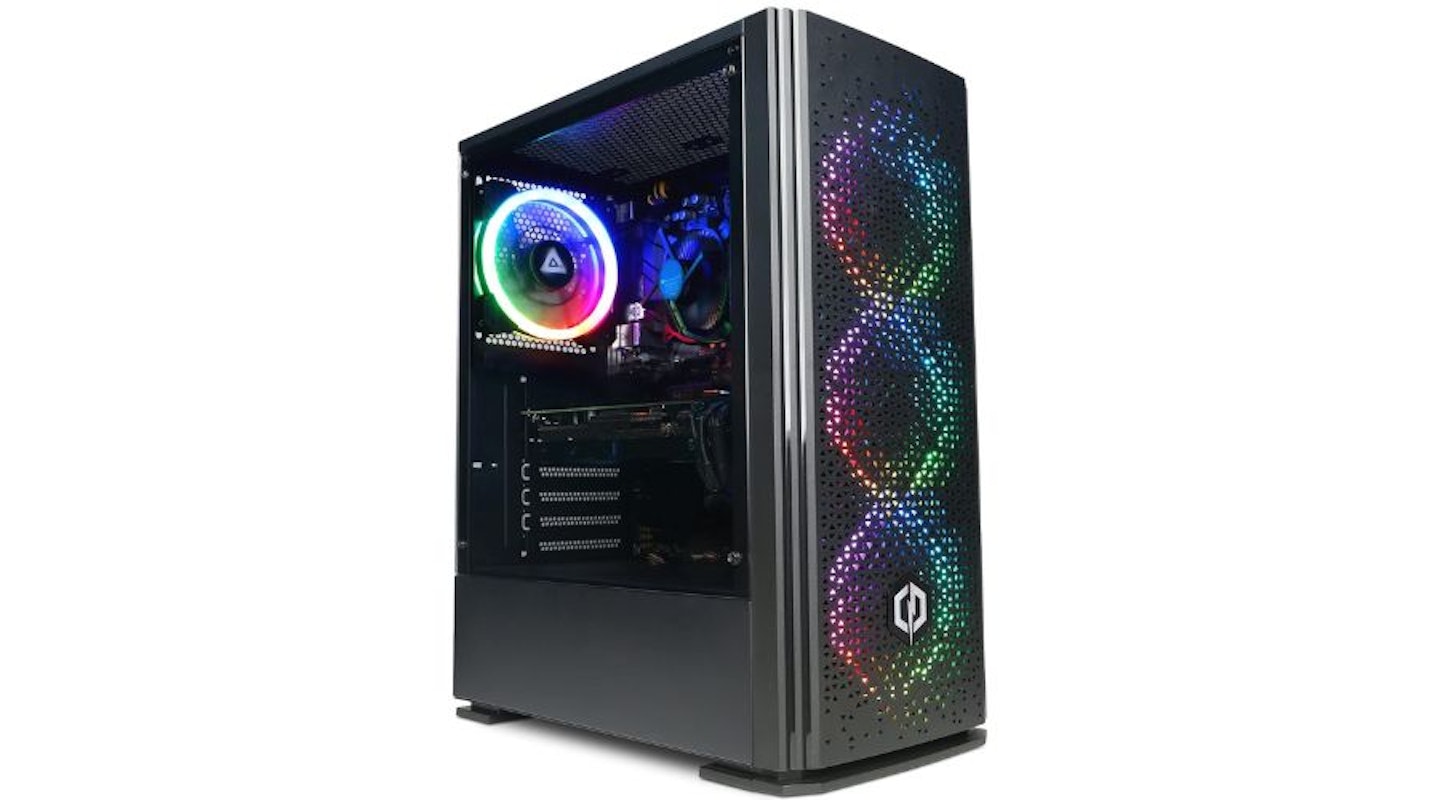 CyberPowerPC
CyberPowerPCA brilliant budget PC for less than £1,000, CyberPowerPC Wyvern gaming PC brings plenty to the table in terms of sheer performance and design, making it one of the more appealing budget builds of the year.
We've seen a noticeable decline in card prices this year, which is only a good thing for gamers, and it's particularly evident in the Wyvern PC. Nvidia's 4060 GPU is a stunning graphics card, capable of more than its fair share of high-octane gaming, and to see it in such a cheap build is phenomenal.
As for its other components, the Wyvern's 16GB of RAM offers stable performance, and its 500GB of SSD storage are certainly commendable at its price, but its CPU has left us longing for something a little more heavy-duty.
AMD's Ryzen 5 5400 CPU is most certainly a budget CPU: with six cores and six threads, it's largely outclassed by more modern options on the market, but choosing a lower-end CPU was likely an easy decision for CyberPowerPC. At the cost of a little extra graphics card performance, slower CPU performance is a worthy sacrifice, especially on a machine made specifically for gaming.
What's more, you're still going to be able to run demanding games on this rig, without too much concern of lag, especially if you're gaming on a full-HD monitor. CyberPowerPC's Wyvern is an impressive budget gaming PC with plenty of strong hardware to get you gaming at a smooth refresh rate, even with the latest AAA games.
Pros
- Phenomenal low-price gaming PC
- Terrific 4060GB graphics card
- Beautifully designed with plenty of space for future upgrades
Cons
- Slightly lower end CPU doesn't offer much in terms of performance
| CPU | AMD Ryzen 5 4500 |
| GPU | Nvidia RTX 4060 8GB |
| RAM | 16GB RAM |
| Storage | 500GB NVMe SSD |
| Dimensions | 416 x 217 x 362 mm (H x W x D) |
| Weight | 10.2 kg |
Best graphics card
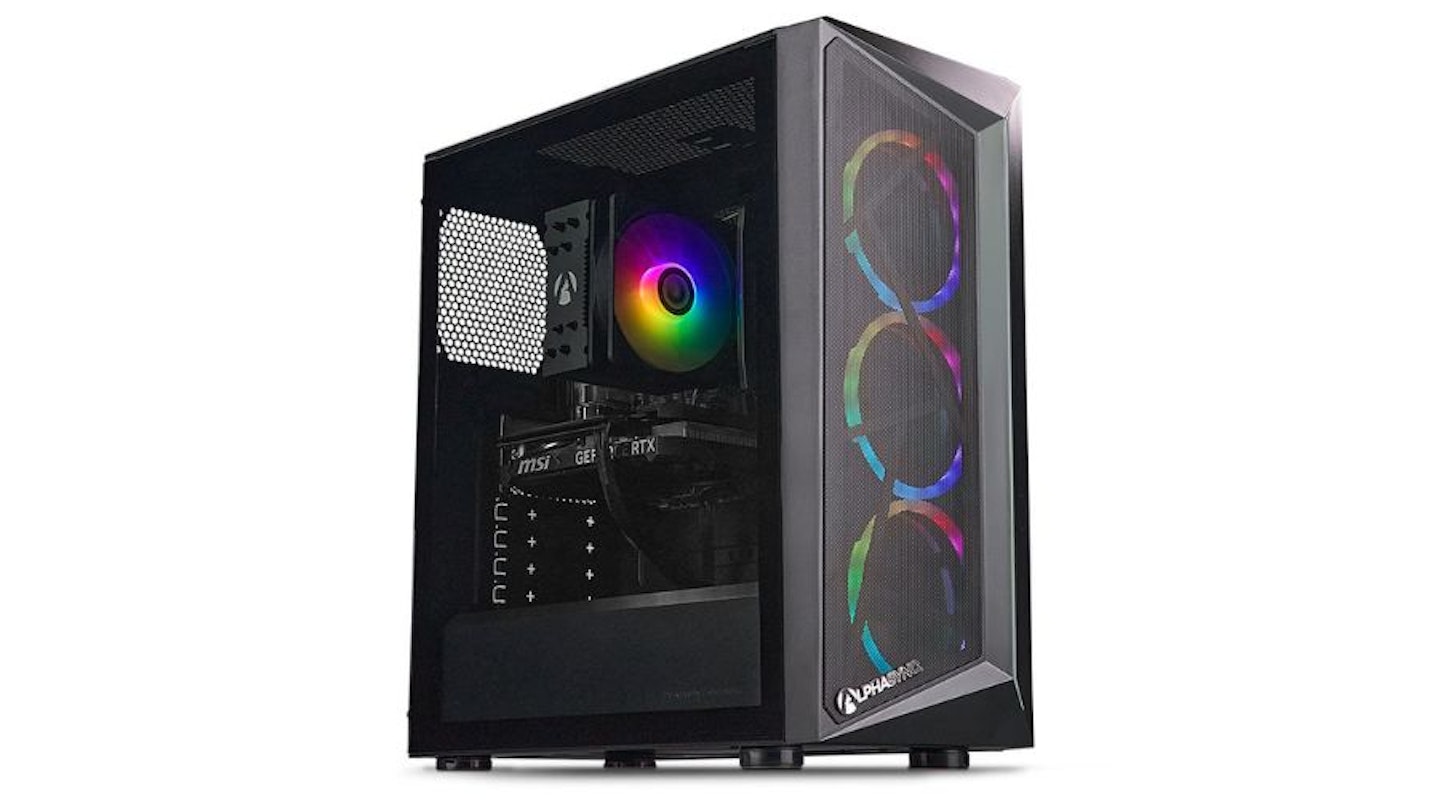 AlphaSync
AlphaSyncPerhaps one of the best-priced gaming PCs on the market this year, AlphaSync's Gaming PC, loaded with a 40-series NVIDIA graphics card, a mindblowing 32GB of RAM, and a sizeable 1TB of SSD storage is an absolute bargain for less than £1,000.
Housed in a gorgeously modern PC case, fit with eye-catching RGB lighting and carefully selected components that look impressive through the AlphaSync's glass, this gaming PC is a standout amongst the droves of mediocre mid-tier PCs that are likely to struggle under the increasing demand of AAA gaming.
This PC's 32GB of RAM and 4060Ti graphics card are unparalleled in sheer value: this killer combination is perfect for next-generation gaming, but its CPU leaves something to be desired. The AMD Ryzen 5 5600X isn't the best we've come across in a budget build, and it's certainly on the cheaper side of things. And yet, when combined with its other terrific components, the AlphaSync Gaming PC works brilliantly well.
Easily one of our favourite gaming PCs of the year, with the best graphics card you can get at its price, the AlphaSync gaming PC is certainly one PC to look out for.
Pros
- Phenomenal value gaming PC
- Impressive 32GB of RAM
- Stunning PC case
Cons
- CPU is on the cheaper side compared to other components
| CPU | AMD Ryzen 5 5600X |
| GPU | NVIDIA GeForce RTX 4060Ti |
| RAM | 16GB DDR4 |
| Storage | 1TB NVMe SSD |
| Dimensions | Not specified |
| Weight | Not specified |
Best bundle
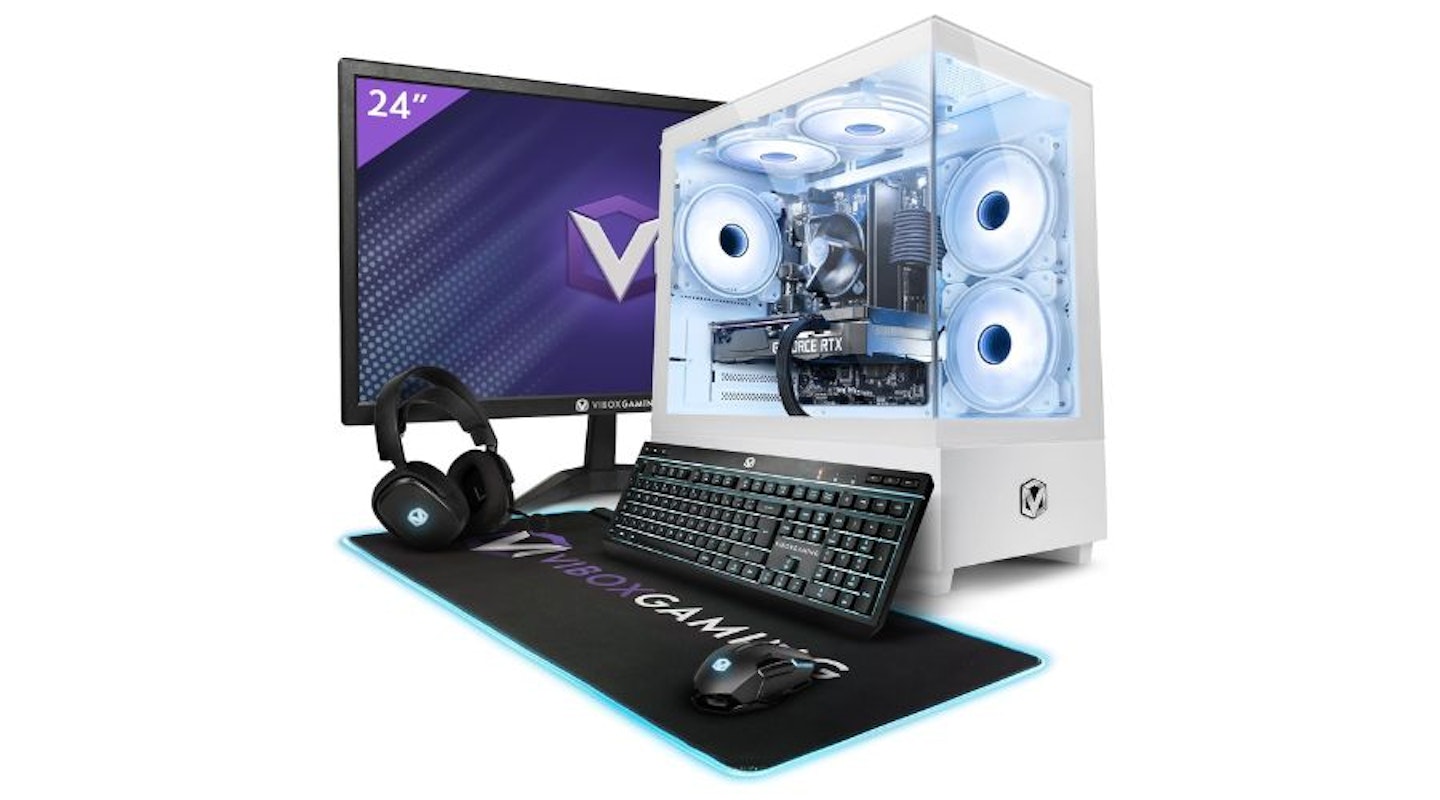 Vibox
ViboxVibox is a leader when it comes to solid gaming PC bundles, and this one really does hit the mark. First, let's see what the bundle gives you. A 1080p monitor, a gaming keyboard with RGB lighting, a matching mouse, a mouse mat and even a gamer headset with a mic.
Now, don't expect these peripherals to be perfect alternatives to those from brands like Razer or Corsair – they'll be serviceable budget items that do the job. But, if you're on a budget and need a gaming rig that gives you a whole system in one go, you can't go far wrong. Plus, you can then upgrade at your leisure.
As for the all-important machine itself – this is absolutely where the money has been well-spent. The graphics card is an Nvidia RTX 3050 with a reliable 6 GB of onboard RAM. And then there's the 16GB of actual system RAM and a 1TB SSD for your data. The CPU is a brilliant cutting-edge Intel i9 11900 too. All in all, it's a bit of a hidden over-specced gem for the price. Don't miss this one if you're looking for a respectable gaming rig for less.
Pros
- Unbeatable value as a one-stop-shop complete gaming PC solution
- Brilliant base spec with an RTX 3050 GPU and 16GB of RAM – ideal for modern games
- Modern gamer-friendly case design will fit in your game room perfectly
Cons
- Peripherals are basic – you'll want to replace the keyboard and mouse at some point
| CPU | Intel i9 11900 |
| GPU | Nvidia Geforce RTX 3050 6GB GDDR6 RAM |
| RAM | 16GB DDR4 3200MHz |
| Storage | 1TB NVMe M.2 Solid State Drive |
| Dimensions | (PC) 39.3 x 18.8 x 38.2cm (H x W x D) |
| Weight | (PC) 8.64kg |
Best ultra budget
 Veno Scorp
Veno ScorpThis Veno Scorp Gaming PC is a brilliant choice for those looking to stick to a budget. It comes with 16GB RAM right out of the box, comfortably keeping up with other PCs that are over twice its price.
That said, although we're always fans of SSD storage for fast load times, this only has a 256GB drive, so you’ll probably need to budget for an upgrade or an external SSD. It does come with a 1TB hard drive, so you won't be short on space, but the load times might not be the best.
The CPU is a capable Intel Core i7, and the GeForce GT 710 GPU helps this system run games with middle-of-the-road requirements. It's not the most powerful machine around, but if you prefer to play older titles or less intensive indie games, then this PC should do you well.
Pros
- Very budget-friendly and affordable
- 16GB RAM is great for this price range
- Great RGB lighting and case design
Cons
- Hybrid storage system might not suit everyone
| CPU | Intel Core i7 |
| GPU | GeForce GT 710 |
| RAM | 16GB |
| Storage | 256GB SSD + 1TB HDD |
| Dimensions | Not specified |
| Weight | Not specified |
Best mini gaming PC
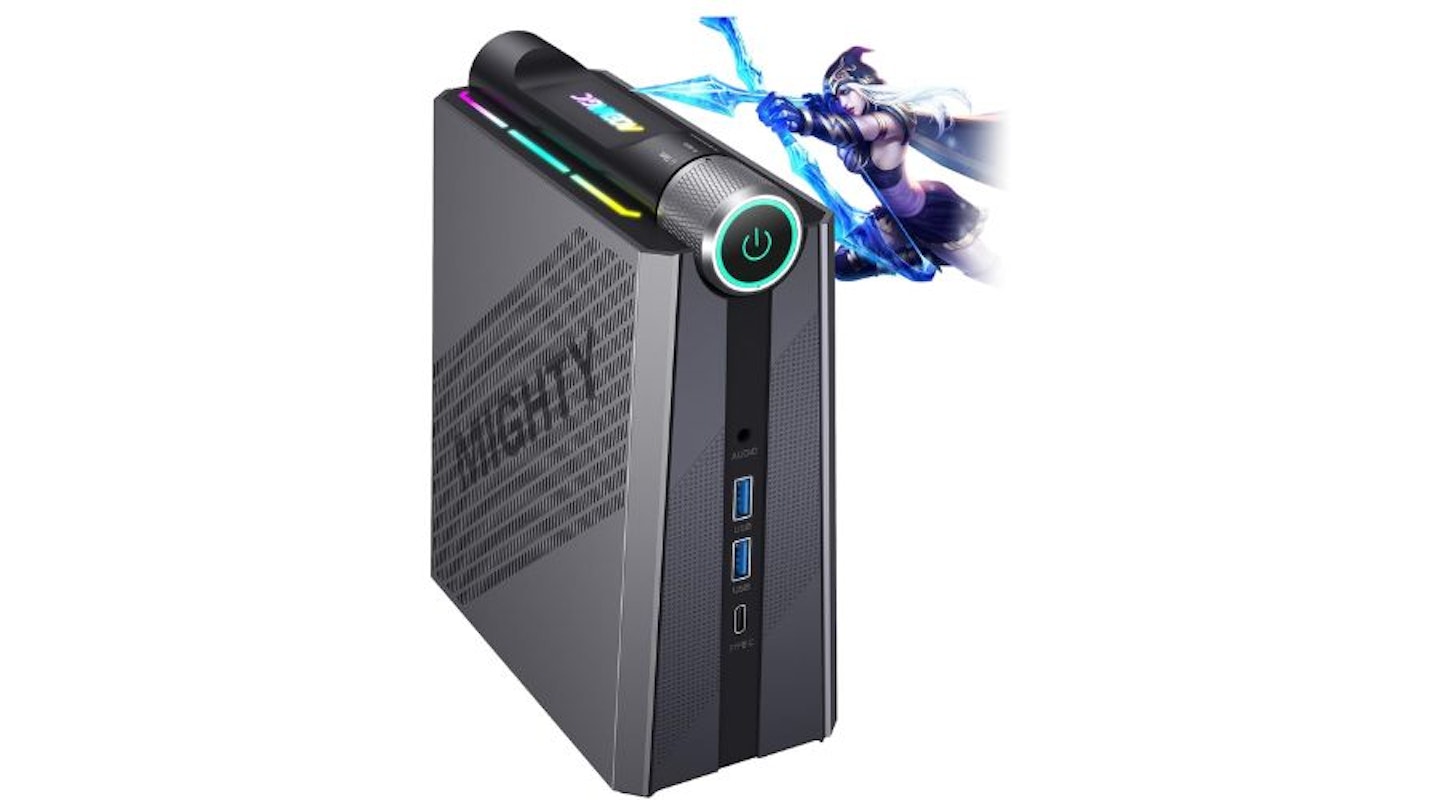 ACEMAGIC
ACEMAGICNot every gamer is all about giant tower cases and endless upgradability. Sometimes what’s needed is a compact and portable rig that still has enough power under the hood to deliver a solid gaming experience. This little wonder from ACEMAGIC is a true gaming PC – and it has the specs to prove it. The processor is one of the best out there, an Intel i9, beating many full-size PCs in terms of sheer number-crunching speed.
RAM is also not skimped on, thanks to the 16GB on offer. As you might expect from a small machine, there’s only limited case space – so the GPU is an onboard Intel XE 750. As mobile graphics processors go, it’s a good one and is capable of decent frame rates on modern titles like Dota 2 and League of Legends.
All that being said, we think you should also budget for an external SSD (or an internal SSD upgrade) if you’re planning on playing a large library of games, as this only comes with a 512GB drive.
Pros
- Excellent compact design yet retains serious processing power
- Amazing CPU that can beat many full-size PC systems
- 16GB of RAM is more than enough for modern gaming
Cons
- No separate dedicated graphics card due to the compact size
| CPU | Ιntel i9-11900H |
| GPU | Intel XE 750 (32EU) integrated graphics |
| RAM | 16 GB DDR4 |
| Storage | 512 GB NVME SSD |
| Dimensions | 29.7 x 25.1 x 14.5 cm (HxWxD) |
| Weight | 2.24 kg |
Best CPU
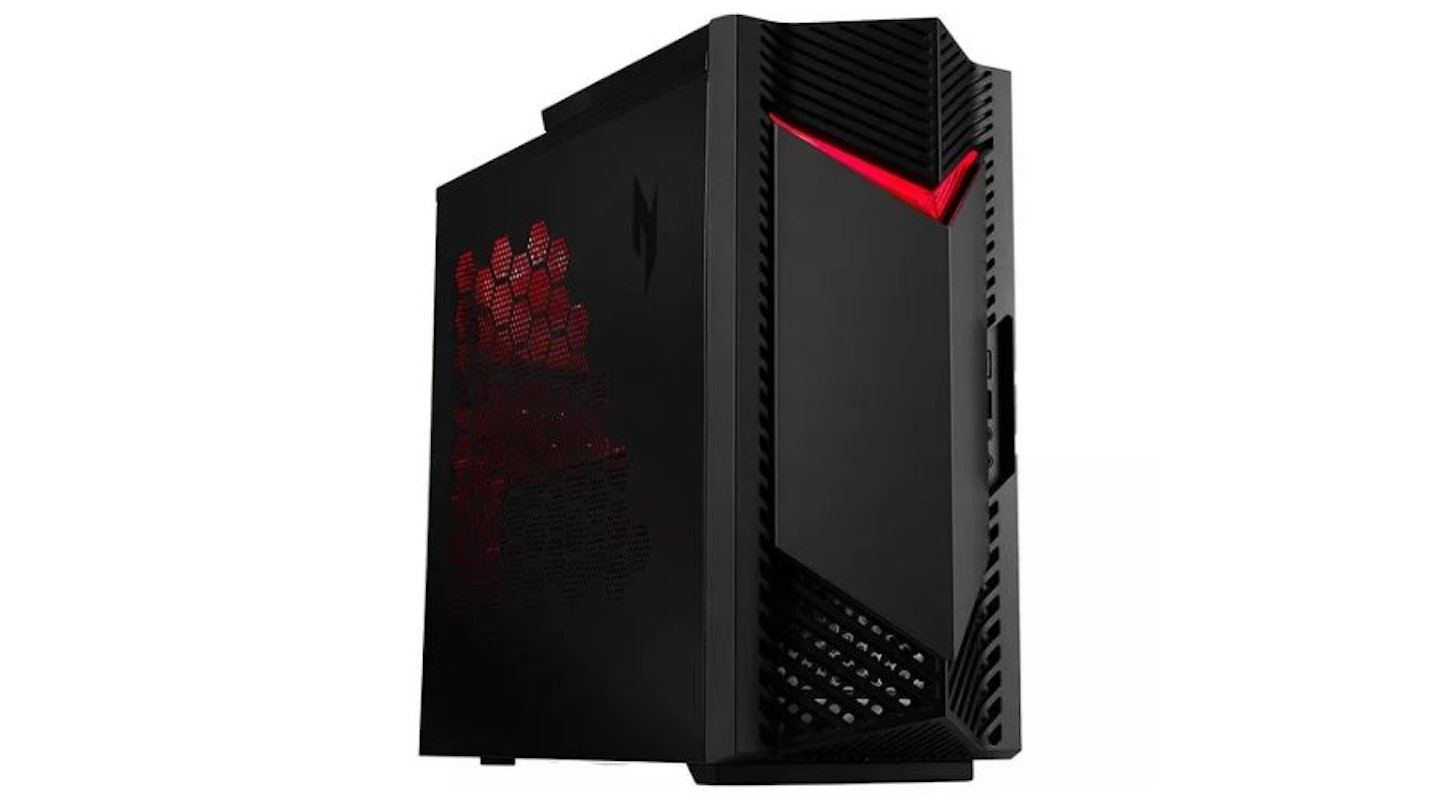 ACER
ACERThe ACER Nitro N50-650 is one of the latest iterations in Acer's Nitro lineup, and it expertly balances budget and power with its high-performance hardware. An expertly well-balanced gaming PC, the Acer Nitro N50-650 gaming PC boasts an array of fantastic hardware, including a terrific NVIDIA 4060 GPU with 8GB of VRAM, 16GB of RAM, a generous 1TB of SSD storage, and best of all, a 13-series Intel i5 processor.
Brimming with 10 cores, 16 threads and an average clock speed of 2.5GHz, performance on this gaming PC is only made stronger by this brand-new CPU from the ever-reliable Intel. Performance in general on this midrange CPU is outstanding and is an especially good choice for gamers and those needing a reliable PC for office work.
The Acer Nitro N50-650's overall size makes it ideal for smaller desk spaces, the case itself being significantly smaller than most PCs of similar specifications on the market, but herein lies some potential downsides in the future. Its smaller stature might make it more suitable for efficiency's sake, but it could cause some future upgrading issues.
Should you want to upgrade your graphics card to something more powerful, you're typically looking at a larger-sized card, and not all graphics cards are accommodating of smaller PCs. Since PCs are designed to be easily upgraded over time, you should certainly consider this aspect of the Nitro N50-650 gaming PC.
As it stands, however, the NVIDIA RTX 4060 GPU is a terrific choice for modern AAA gaming, you're unlikely to be limited in games you can play with this setup regardless, and as far as hardware goes, the N50-650 is an incredible bargain at its price. A truly excellent gaming PC capable of handling its own when it comes to performance, with its CPU being a particularly strong standout of the build, it's a terrifically well-priced PC build when considering the price of its unique components.
Pros
- Brilliant value gaming PC
- Phenomenal CPU performance
- Excellent design with brilliant connectivity
Cons
- Smaller PC case size might limit future upgrade potential
| CPU | Intel® Core™ i5-13400F Processor |
| GPU | NVIDIA GeForce RTX 4060 8 GB |
| RAM | 16 GB |
| Storage | 1 TB SSD |
| Dimensions | 392 x 175 x 386 mm (H x W x D) |
| Weight | 6.7 kg |
Best design
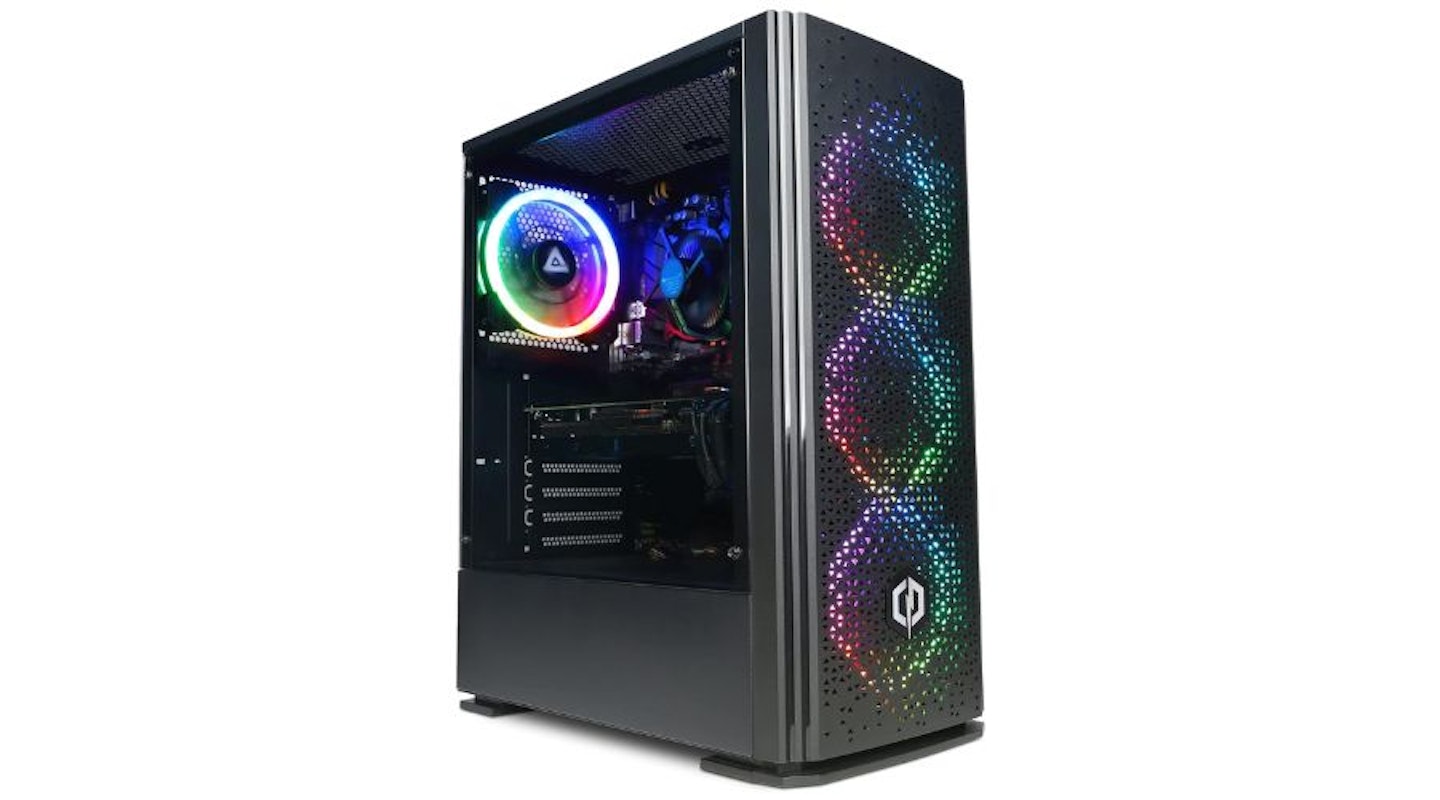 CyberPowerPC
CyberPowerPCCyberPowerPC's Wyvern has been a mainstay of great budget gaming PCs for a while now, and with some timely graphics card price drops, there have been performance upgrades to match.
We find the most notable feature of the CyberPowerPC to be the phenomenal Nvidia GeForce RTX 3050 GPU with 8GB of onboard RAM. As a budget pick, this is a powerful graphics card – able to handle plenty of cutting-edge games at 4K, no questions asked. And, thankfully, even after squeezing that Nvidia card into the case, the rest of the components haven't suffered too much from the budget price tag.
The CPU is an Intel Core i5, and 500GB of SSD storage is still perfect for a fast-booting operating system – although, in terms of game installs, heavy users may be upgrading with an external or internal HDD or SSD in no time at all. The case is perhaps a little basic in terms of design, too. That said, thanks to the CyberPowerPC Wyvern's fantastic graphics card and RAM, this gaming PC is still absolutely worth it.
Pros
- Great RTX 3050 graphics card – especially good value at this price point
- A solid amount of RAM and a respectable CPU will keep this performing well over time
- 500GB of SSD storage is good for a budget machine
Cons
- Weaker CPU than some others here
| CPU | Intel Core i5-10400F |
| GPU | Nvidia RTX 3050 8GB |
| RAM | 16 GB |
| Storage | 500GB SSD |
| Dimensions | 416 x 217 x 362 mm ( H x W x D) |
| Weight | 11.95 kg |
Best value
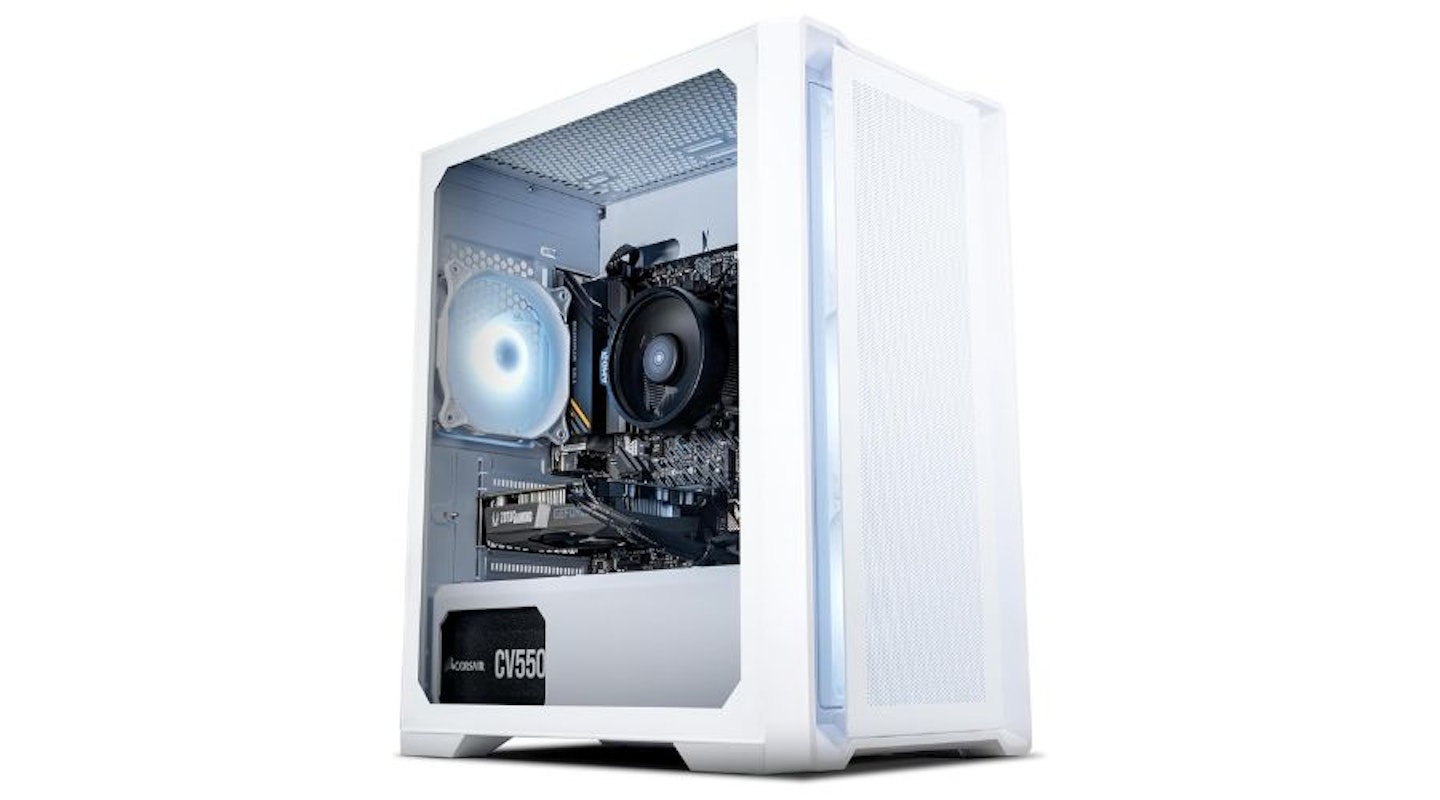 SCAN
SCANIn perhaps one of the most impressive specs here, this PC from SCAN really has balanced things out extremely well. There's power right where you need it at just the right level to keep the price tag nicely under the £1k mark. This Nix Gaming PC is a machine that really performs while still leaving enough budget for a keyboard, mouse and more.
And in terms of capabilities, this machine really shines. That’s mainly thanks to an Nvidia RTX 4060 graphics card – the star performer here. That said, you also have 16GB of RAM, a Ryzen 5 CPU and a 1TB SSD for good measure.
The case has tempered glass and mesh grills for great airflow. Customisable RGB fans are present too for that extra bit of gaming aesthetic to go with that white case. Stunning value and balanced performance.
Pros
- Brilliantly balanced spec which doesn't cut the wrong corners, retaining sheer performance
- RTX 4060 GPU for the latest and greatest gaming experiences
- 16 GB of RAM is a nice surprise – we were expecting 8GB for this price.
Cons
- The case is well-engineered, but a little outdated style-wise
| CPU | AMD Ryzen 5 5500 |
| GPU | NVIDIA GeForce RTX 4060 8 GB |
| RAM | 16 GB DDR4 |
| Storage | 1TB SSD |
| Dimensions | 38 x 21 x 40 cm (HxWxD) |
| Weight | Not specified |
Best for FPS
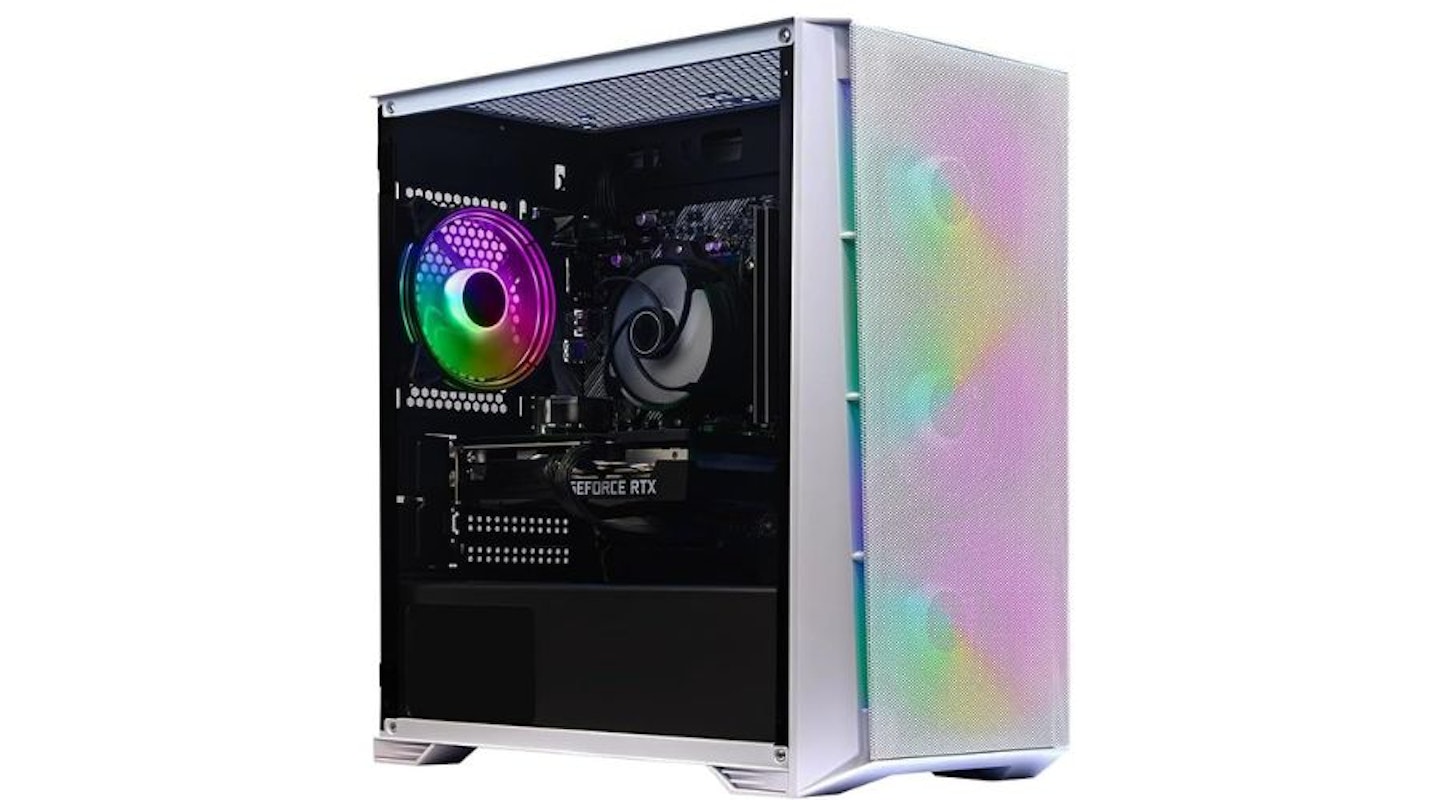 ADMI
ADMIWith a striking mesh case design, this ADMI Gaming PC is sure to draw your attention. It's not just visually impressive, though, as the performance is sure to be more than enough for most games you throw at it. If you want to be sure that you'll never have to suffer framerate issues, this is the machine for you. Just be aware that it can get a bit noisy from time to time.
Spec-wise we have a good graphics card inside – the RTX 4060. This system does have a capable CPU (an Intel 12400F). That makes it far from a budget choice when it comes to processing power, providing plenty of grunt to the system. 16GB of RAM and a 1TB SSD finish off the package nicely.
Pros
- A great combination of 16GB RAM and GPU with the RTX 4060 GPU for great gaming performance
- Excellent performance that will rarely drop frames
- Eyecatching mesh case design
Cons
- Can be a bit noisy at times
| CPU | Intel 12400F |
| GPU | RTX 4060 |
| RAM | 16GB |
| Storage | 1TB SSD |
| Dimensions | 410 x 500 x 630 mm (HxWxD) |
| Weight | 10.2 kg |
Choosing the best gaming PCs under £1,000 in 2025: Buyer's guide
Choosing a new PC can be complicated at the best of times, but it can seem even more so when you throw gaming into the mix. With the choice of components, codes and frequencies being so vast, it can be a little overwhelming. But have no fear. You can read on to find out what to look for in a gaming PC and how to choose the right one for you.
Prebuilt or custom?
Many popular prebuilt rigs can start at over £1,000, with the option of custom configurations only adding to the cost. Custom-built PCs are often heralded as a more economical way of getting into high-spec PC gaming. This is all good, but a self-build can feel like an overwhelming prospect to a newcomer in a world already heavy with jargon, abbreviations, and acronyms. But you can grab the best gaming PCs under £1,000 that are pre-built and more than up to the task. The key is to know what to look for – here are some tips.
Balance your CPU, RAM and GPU
As with most tech, the more you can afford to spend on any one component the better. If money is no object then 32GB of RAM, an Intel i9 or Ryzen 9 CPU with high clock speeds, a 2TB or higher SSD and a high-end Nvidia 40-series graphics card will tackle any game you throw at it. At the more budget end, light and casual gamers who play less graphically-intensive titles should look at 8GB of RAM, an i5, i7 or Ryzen 5 or Ryzen 7 CPU and a 1TB SSD. Your money here should be spent on any dedicated (not onboard or built-in) graphics card as the latter are not powerful enough for the vast majority of games.
Decide what sort of games you want to play
This can be a specific game or genre. Think about what you want to play, look up the specifications required, and search for a gaming PC based on these stats. This can help you prioritise your needs and maximise the impact of your cash.

Blockbusters like Elden Ring and Baldur's Gate 3 and the next-generation update of The Witcher III are very resource-heavy, requiring plenty of RAM and a powerful GPU. However, older releases and indie games, from Civilisation 5 and Portal 2 to Stardew Valley and Among Us, aren’t going to need as much oomph.
Consider using your PC for non-gaming tasks
Do you want to use the PC for other tasks, like Photoshop or video editing? If so, then powerful GPUs and CPUs are needed, even if you only ever play Minecraft. This is also the case if you’re planning to stream your content on platforms like Twitch.

If you plan on using your PC for creative pursuits, you'll also want to consider getting one of the best monitors for the job. When doing so, pay particular attention to the panel type and colour support such as P3 or Adobe sRGB.
Add up your storage needs
How many games do you have or want, and how big are they? The answer to this question will determine how much storage you need and in what form. Only want to play CS:GO? Cool – a 240GB SSD will do for a start. Want to play Microsoft Flight Simulator and COD: Warzone? Well, that’s over 200GB combined, so you need a big SSD or HDD. Remember, you'll need some space for updates, too.
If you plan on editing photos and videos, you’re also going to find memory getting tight. An external drive will help with these, but we recommend that games are always stored internally – ideally on SSD or at least a fast HDD.
Don't forget peripherals
Once you’ve picked out your chosen PC tower, you will want the best gaming peripherals. Nothing will help your stats better than a quality gaming keyboard and a gaming mouse. Some of the best budget gaming monitors are a great match for the systems we've recommended here. Bear in mind that your monitor will need to have some high refresh rates and response times for gaming, too.
Gaming PC Jargon explained:
CPU
A Central Processing Unit, or CPU, processes and executes instructions. Processors often consist of multiple cores and threads, and the higher the number of both the more concurrent processes it can carry out, improving performance. A CPU's clock speed is also important and is measured in GHz. For a good gaming experience, your average player will typically want between 3.7GHz and 5GHz.
RAM
Random Access Memory, or RAM, is a component that temporarily holds bytes of information for quick and random access by the CPU. The information will be related to programs and services that are in use. The more RAM available, the more quick-access information there is available to the CPU, thereby improving computer performance. Gamers will want no less than 8GB of RAM.
DDR3 and DDR4 are generations of RAM. DDR3 was introduced in 2007, and DDR4 in 2014. The main differences between the two relate to the voltage used, latency times, clock speeds, and overall performance. For most entry-level users, the variations between the two will not matter, as both perform very well.
Graphics cards
The best graphics cards improve the visual experience and improve a PC’s overall performance – they are seen as essential components for gamers.
A graphics card’s job is to convert CPU data into visual output. There are many types, specifications, and sizes of graphics cards. Typically, these cards have dedicated RAM and processor(s), fans and heat-syncing solutions. Sometimes graphics cards are referred to as GPUs, which is just an abbreviation of the card's processor name, a Graphics Processing Unit. Some of the best PC games available right now require top-of-the-range cards to perform at their best, so do your research.
Some CPUs and motherboards have in-built graphics cards. While acceptable for standard computer usage, these in-built options are insufficient for high-performance gaming, especially when compared with dedicated graphics cards.
HDD and SSD storage
Hard drive disks (HDD) are mechanical, writing, and reading information on spinning disks (or platters) via an actuator arm, which moves across the platter. The platters are broken down into a series of tracks and sectors. It's within these that data is stored and addressed with a location. HDDs are reliable, though they are larger and slower than SSDs. HDDs are cheaper though, and are available with much larger storage capacities. It is common practice within the gaming community to have both an SSD and HDD in a build.
Solid State Drives write and read using flash memory, much like USB flash drives. Data is stored in grids and blocks, and though the process is more complicated than in HDD, the available space is utilised more efficiently thanks to a series of processes that go on behind the scenes. Some of the best SSDs on the market are super-fast and aimed at gaming PCs. SSD technology uses no moving parts and is popular within the gaming community due to its rapid load times.
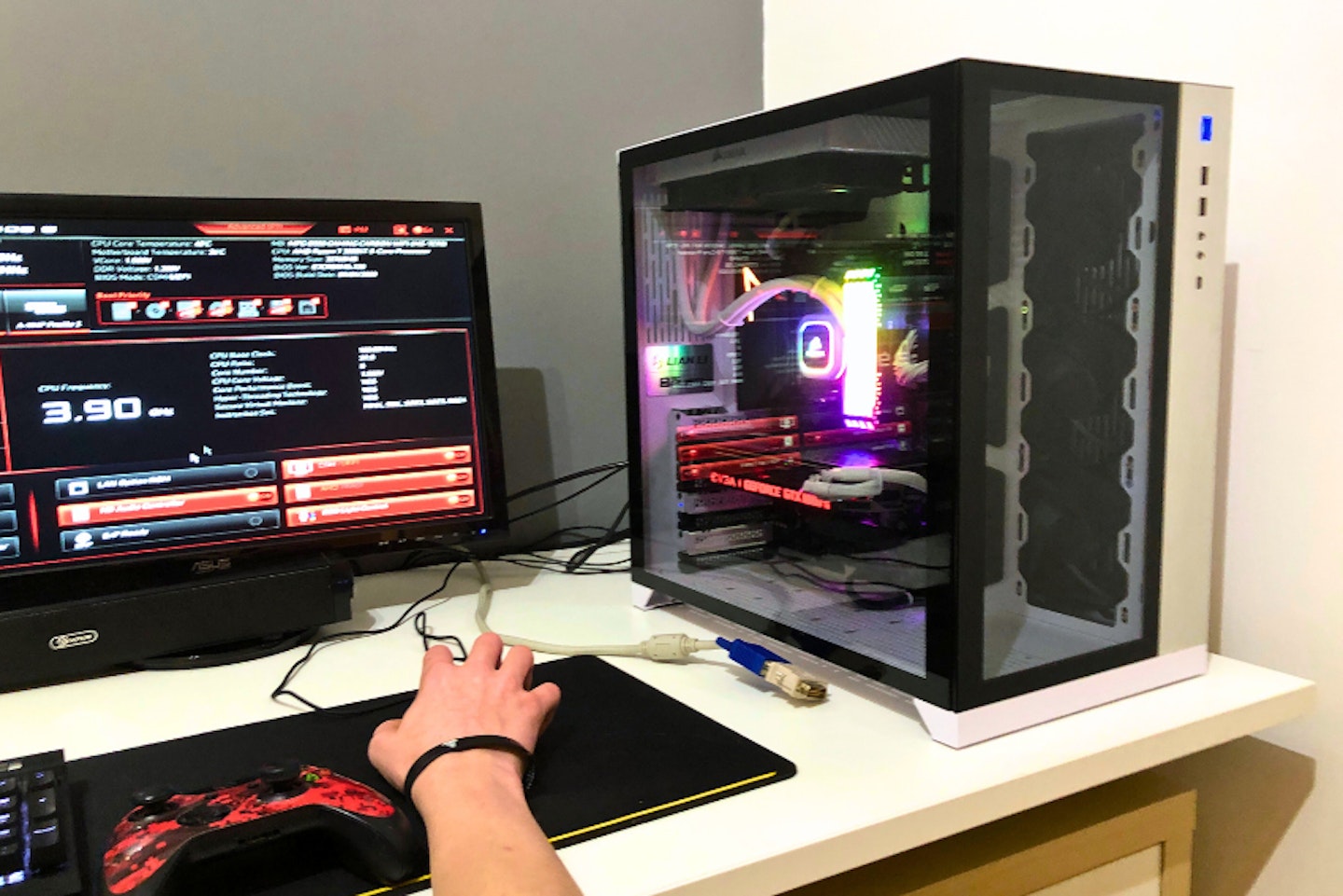
Quick reference guide: Popular game specs
Specifications as reported by wepc.com
Fortnite
• CPU – Minimum: Core i3 2.4GHz / Recommended: Core i5 2.8GHz
• RAM – Minimum: 4GB RAM / Recommended: 8GB RAM
• Storage – Required: 16GB free space
• GPU – Minimum: Intel HD 4000 (integrated graphics) / Recommended: Nvidia GeForce GTX 660, AMD Radeon HD 7870, or equivalent with 2GB memory or higher VRAM.
• OS – Required: Windows 7, 8.1, or 64-bit Windows 10
Elden Ring
• CPU – Minimum: Intel Core i5-8400, AMD Ryzen 3 3300X / Recommended: Intel Core i7-8700K, AMD Ryzen 5 3600X
• RAM – Minimum: 12GB RAM / Recommended: 16GB RAM
• Storage – Required: 60 GB of storage space
• GPU – Minimum: NVIDIA GeForce GTX 1060, 3GB or AMD Radeon RX 580, 4GB / Recommended: NVIDIA GeForce GTX 1073, 8GB or AMD Radeon RX Vega 56, 8GB
• OS – Minimum: 64-bit Windows 10 / Recommended: 64-bit Windows 10
Dragon's Dogma II
• CPU – Minimum: Intel Core i5 10600 or AMD Ryzen 5 3600 / Recommended: Intel Core i7-10700 or AMD Ryzen 5 3600X
• RAM – Minimum: 16GB RAM / Recommended: 16GB RAM
• Storage – Required: 70 GB of storage space
• GPU – Minimum: NVIDIA GeForce GTX 1070 or AMD Radeon RX 5500 XT / Recommended: NVIDIA GeForce RTX 2080 or AMD Radeon RX 6700
• OS – Minimum: 64-bit Windows 10 or Windows 11 / Recommended: 64-bit Windows 10 or Windows 11
Baldur's Gate 3
• CPU – Minimum: Intel Core i5 4690 or AMD FX 8350 / Recommended: Intel Core i7 8700K or AMD Ryzen 5 3600
• RAM – Minimum: 8GB RAM / Recommended: 16GB RAM
• Storage – Required: 150 GB of storage space
• GPU – Minimum: NVIDIA GeForce GTX 970 or AMD Radeon RX 480 / Recommended: NVIDIA GeForce RTX 2060 Super or AMD Radeon RX 5700 XT
• OS – Minimum: 64-bit Windows 10 / Recommended: 64-bit Windows 10
FAQs
What makes a great gaming PC?
All modern computers have similar needs when it comes to basic components. But what sets a gaming PC apart from a standard home or office PC is that you are investing in more power where it's needed. Yes, you'll need a fast Wi-Fi card for gaming and other extras like a gaming mouse, but here's a quick overview of the key components to bear in mind:
Graphics Processing Unit (GPU) – Perhaps the most important component of any gaming PC is the GPU. With leading game titles demanding ever-higher resolutions, 3D graphics, dynamic lighting and other effects, the more power your graphics card has the better. AMD and NVIDIA are leading brands, each with their own series of cards and chips with varying amounts of onboard video RAM. Prioritise your spending here and you won't go far wrong.
Central Processing Unit (CPU) – This chip is central to your gaming system. It'll crunch all the numbers and, in part, dictate how fast your machine will run games. The most popular CPU brands are Intel and AMD. Other than their particular model name, CPU speed is measured in megahertz (MHz) or gigahertz (GHz) – the higher the better. And the more cores and threads the CPU has the more concurrent calculations it can make.
Random Access Memory (RAM) – RAM is the working memory of your gaming PC. A CPU without several gigabytes of RAM would have no space to perform any calculations. The typical RAM requirement for gaming is 16GB, but 32GB is more future-proof.
Solid State Drive (SSD) – This is your storage space for applications and, of course, games. So, if you're planning on playing a large library of AAA games, you'll need at least 1TB of space – preferably 2TB. A solid-state drive is much faster than a traditional hard drive – ideal for the operating system and speedy load times.
Are gaming PCs better than consoles?
A console can rarely be upgraded – with the exception of adding extra storage drives. They do, however, offer some seriously powerful custom-designed hardware in the form of CPUS and graphics power. If you're not into the ins and outs of owning and updating a gaming PC, a next-gen console is the way to go.
But, PCs have the edge when it comes to upgradability, allowing you to add more RAM and a new GPU as time goes by. Plus, a gaming PC doesn't have to be used purely for gaming, it can be used for other highly demanding tasks such as editing and rendering, as well as your essential web browsing. For games, PC has always had the best and latest hardware to deliver cutting-edge experiences. Plus, because a PC isn't as locked down as consoles, you can indulge in some modding. That means proper game upgrades, fan-based content, and true freedom to play your way.
Is a £1000 PC good for gaming?
Absolutely. If you're looking at spending around £1000 you'll have plenty of choice – as you can see from our recommendations above. But you'll also be able to play the latest games reliably without breaking the bank on a rig costing thousands. Yes, the more you spend the faster and more powerful your system will be – but by choosing a PC in this price bracket you can upgrade your components later to spread the cost and keep up with the latest tech as you go.
What is the best gaming PC to buy?
As with our recommendations here, this is all down to identifying your needs. And that means looking at the sort of games you like to play the most. If you're into the latest AAA game titles then you'll need a rig with more grunt in the GPU and RAM department. But, if you love indie titles and less graphically intensive games then you will be able to buy a PC for a little less money with a more conservative spec, allowing you to upgrade later if you need to.
For our pick from this list, we recommend the PCSPECIALIST Icon 240. With its brilliant CPU and GPU, it's perfect for those wanting to get the best perfromance out of their video games. While we would prefer 32GB of RAM, 16GB is still very solid for a PC under £1000. Plus, the ventilation is very reliable, so you don't need to fret about the PC overheating.
Why should you trust us?
At What's The Best, our mission is to provide accurate and reliable reviews, ensuring our readers receive honest and transparent information about the best technology products available. Anything less would undermine our commitment to being a trusted source of unbiased product information.
Our dedicated in-house writing team comprises experts with extensive experience and a genuine passion for technology. Collectively, we have spent decades testing and writing about tech, leveraging our expertise in all our articles, advice pieces and reviews.
We maintain complete editorial independence and do not accept payment for product reviews. Our writers have full control over their content, ensuring that products are selected based solely on the needs of our readers. While we may earn commissions or other compensation from links on our website, this never affects our product choices. These links enable us to continue offering valuable consumer advice, without compromising the integrity of our reviews.
William Lobley is the Editor for What's The Best. Here, he oversees, curates and researches listicles and reviews as many products as his home office can handle. He's an experienced Black Friday bargain-hunter.
He has spent nearly five years writing about tech, audio, outdoors and fitness and has reviewed everything from smartphones to ice baths. In addition, he’s an experienced bargain hunter on Black Friday and Prime Day, always finding genuine deals on electronic and audiovisual tech from top brands.
When not at his desk writing, reviewing or deal-hunting, he'll be relaxing with Japanese crime novels, bingeing some classic anime, strolling the countryside or at the gym listening to the heaviest metal Spotify has to offer.
Subscribe to the What's The Best Newsletter to keep up to date with more of the latest reviews and recommendations from the What’s The Best team.
